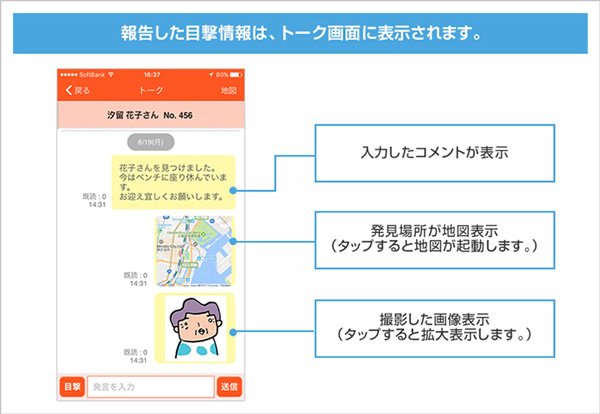Japan is facing a super-ageing society today, especially in regional areas where the number of elderly people are extremely high. A lot of these rural towns are finding it hard to watch over their elderly, some of whom show signs of wandering due to dementia.
Japan’s state-of-the-art ICT (information and communication technology) is answering this problem with an app that both helps find missing elderly and revitalize the area. SoftBank is cooperating with the Ministry of Health, Labor and Welfare to monitor the elderly with dementia, using their “Orange Safety Net” monitoring support service using smartphones. With support from the “Ninchisho (dementia) Supporter Caravan,” the service calls out for support to find people who have gone off wandering. The service is currently underway in Shiwa-cho in Iwate Prefecture, Higashimatsushima-shi in Miyagi Prefecture, and Kumakogen-cho in Ehime Prefecture to speedily detect missing persons and ensure their safety.
What is the Orange Safety Net?
The Orange Safety Net is an app that uses smartphones to monitor the wandering of elderly people due to dementia. All you have to do is register your family’s information who may go wandering. When a search is needed, that information will be distributed to the Orange Cooperative Team and an investigation request beyond the limit of the local government can be made.

(Image: softbank.jp)
How the app works
- Download the app and register family’s information.
- Notify the Orange Cooperative Team nationwide for assistance when a person goes missing.
- Provide information to the search party who have volunteered to help.
- The search begins.
During the search, all members can check the search status real time on their app screen.
Local revitalization efforts using this service
Shiwa-cho in Iwate Prefecture has seen an increase of new people moving into their town in recent years. Finding it hard to detect certain elderly citizen when they go missing, they decided to introduce the Orange Safety Net to their town in July 2019. Up until then, it was hard to hand GPS to elderly people with dementia so they communicated through fax when people went missing—ultimately the search was extremely slow. The app sped everything up, allowing everyone to receive information simultaneously and immediately inform them when a missing person was found.

(Image: softbank.jp)
Higashimatsushima-shi in Miyagi Prefecture is another rural area that introduced the app to its citizens. Due to the Great East Japan Earthquake, the community was greatly reorganized, and many elderly people were left to live in unfamiliar environments. To help monitor these elderly people, the Orange Safety Net was introduced in June 2020. Up until then, search for the elderly were done through photos. Communication among people at search was difficult for there was no way to share information on a real time basis. But by introducing the app, people were not only able to share information real time using a smartphone, but they were also able to build a network with offices other than their own, making it easier to collaborate during the search.
These examples show how a service as simple as a smartphone app can help people living in regional areas handle the problems they face in an aging society, and revitalize the area along the way.
(This article was originally published on Zenbird Media.)
Additional Resources
Zenbird Media Homepage
More on elderly healthcare in Japan
More on social good apps